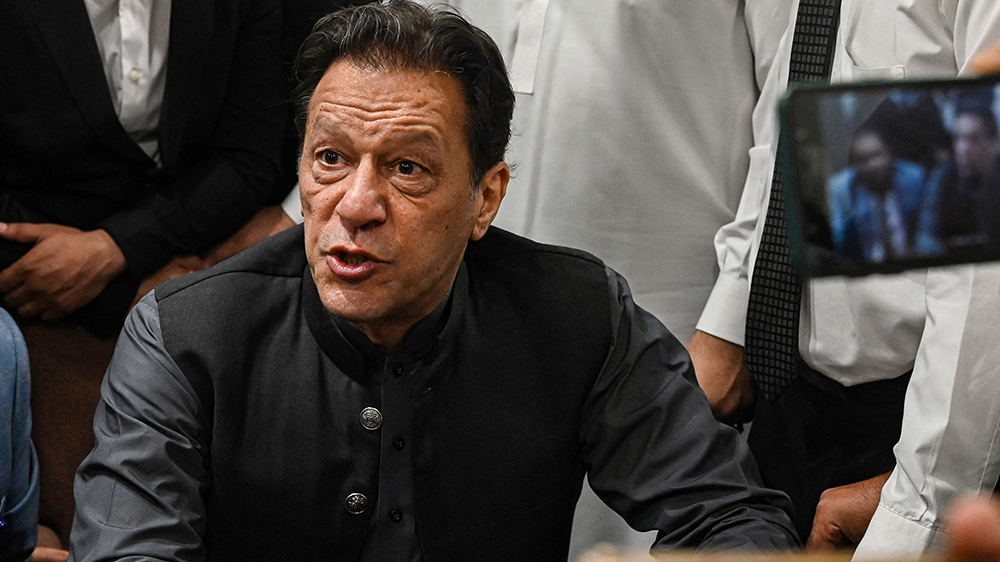The conflict between Pakistan’s government and Imran Khan has sparked a fight for justice in the UK
This is a test for both countries’ political systems, writes Eric Lewis


The conflict between the Pakistan government and its chief challenger, former leader Imran Khan, has already sparked violence and tensions across the country.
The former cricket star is facing numerous corruption charges since he was forced from office last year and was freed from custody in May only after the country’s Supreme Court ruled his arrest had been illegal. He denies all the charges against him.
But the fight for justice in Pakistan is also being played in the UK.
On the night of 28 May, Pakistan security officials raided the home of the Akbar family in Islamabad and arrested Murad Akbar, the brother of Shahzad Akbar. Shahzad has been a distinguished human rights lawyer in Pakistan for many years. I have worked with him when he was fighting against the death penalty in Pakistan, as well as economic and gender inequality. He is a person of keen intellect, absolute integrity and tremendous courage.
When Imran Khan was elected prime minister, Shahzad agreed to join the new government and serve as a senior advisor to the prime minister with responsibility for fighting the endemic corruption in the Pakistani system.
I worked with him again with respect to tracing the proceeds of corruption, as well as in attempting to repatriate the last Pakistani and Afghan detainees at Guantanamo Bay. I also worked with Prime Minister Khan on these issues, which had been the cornerstone of his electoral platform.
Without any sense of irony, the current government that deposed Imran in a staged parliamentary vote of no confidence has now charged Shahzad with – you guessed it – multiple counts of corruption and charged Imran, their real target, as well.
Imran, the most popular politician in Pakistani history, would undoubtedly win a fair election in a landslide, but it looks like the current government is trying one way or another to push him out of Pakistani politics. He was shot during a rally, and he legitimately fears that he has been marked for assassination, like so many of his predecessors. Speaking to The Independent this week he said it was only a matter of time before he was jailed again.
Shahzad, who is married with young children, has recently and reluctantly left the country for London. But that did not prevent the Pakistani government from exercising against him some of the most loathsome tactics in the authoritarian playbook.
A number of British MPs and other public figures have written to the British foreign secretary James Cleverly demanding that Murad be released. They write, “It appears Murad was kidnapped in order to intimidate his brother Shahzad Akbar”.
The letter adds: “People subject to enforced disappearance in Pakistan are at risk of torture and extrajudicial killing … This act of intimidation against a British resident appears to be an act of unacceptable state hostage taking, and it warrants a strong response from the British government and international community.”
I agree that this is an attempt to intimidate Shahzad – and put pressure on him to come back to Pakistan where he could be forced to testify and falsely implicate Imran in wrongdoing.
When Murad was taken, in the middle of the night, around 30 armed men in Islamabad Police and Rangers’ uniforms from the Anti-Terrorism Squad, accompanied by others in civilian clothing, barged into the Akbar family house.
They searched for and took cell phones and electronic devices and took Murad away. Murad’s 19-year-old son, Danial, a law student in the University of London distance learning program, demanded to see a search warrant and the basis for his father’s arrest. Danial was ignored and Murad was placed in one of the 15 vehicles waiting outside, some of which had no number plates.
Lawyers and Danial began visiting and calling police stations. They all denied Murad was in custody. Danial brought a petition for habeas corpus, but the law enforcement authorities at the Islamabad High Court denied they were holding his father.
The Pakistan High Commission in London did not respond to a request for comment by The Independent by the time of publication.
Murad has suffered from a variety of health problems over the years and wherever he is being held, he has not had access to necessary medicines and treatment; his life is literally at stake.
It would suit the Pakistan government to have Shahzad return to Pakistan and testify against Imran – a conviction would take Imran out of the October election and end his political career. But Shahzad could not and would not give such testimony for the simple reason that it would be entirely false, even if he felt it might help his brother.
Pakistan has a sophisticated legal system, significantly based on English law and procedure. But the form of law alone is worse than meaningless. Authoritarian states always have extensive legal codes; but they are selectively enforced to achieve the ends of the regime, not justice.
To arrest the relative of someone whom the regime wants to coerce to give false testimony and hold him incommunicado unless that relative complies with government demands is in breach of international human rights law and domestic criminal statutes.
The Pakistani government is seeking to coerce Shahzad, which is actionable in both Pakistan and the UK.
It may be too much to hope for transparency and justice in the current climate in Pakistan. But other countries can and should make clear that hostage taking and blackmail are unacceptable tools of government.
The UK government should lay down a clear marker that legal residents within UK borders – like Shahzad – will not be threatened or have their families endangered to meet the corrupt political goals of regimes without respect for the rule of law. This is a test for the Pakistani system. But it is one for the UK as well.
Eric Lewis is chairman of Reprieve US, a charity that actively litigates the death penalty, indefinite detention and other human rights cases around the world






Join our commenting forum
Join thought-provoking conversations, follow other Independent readers and see their replies
Comments